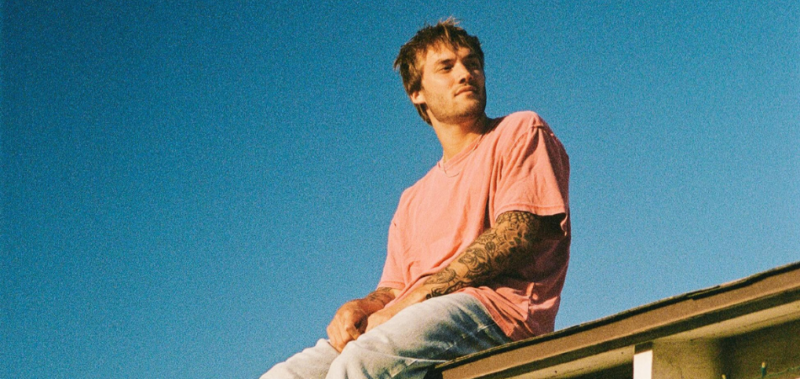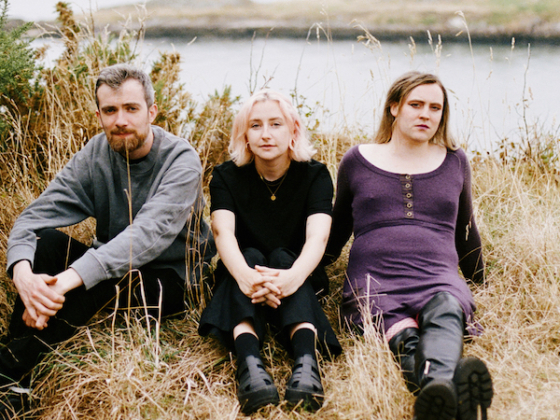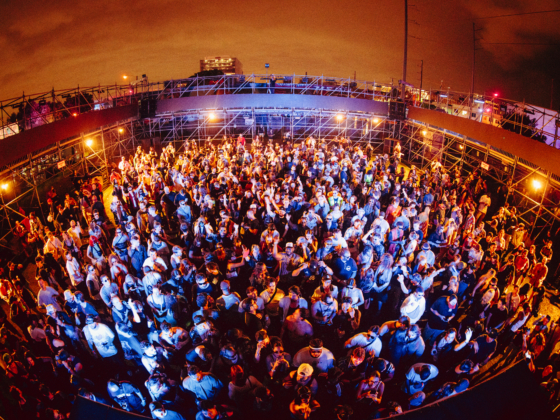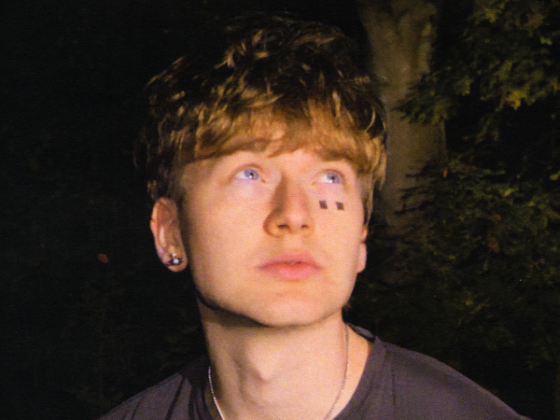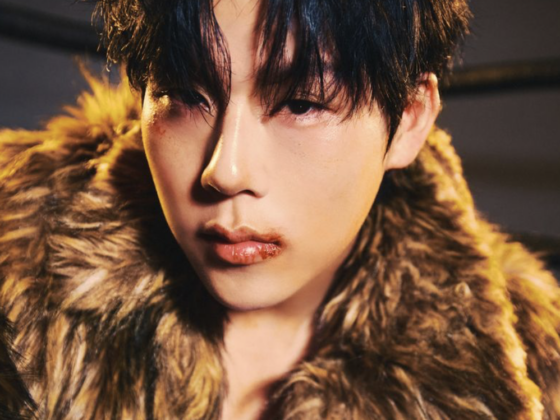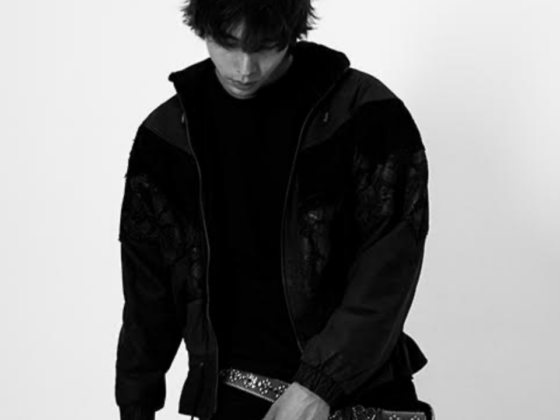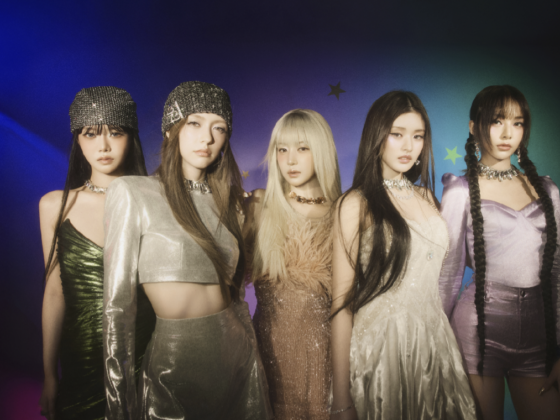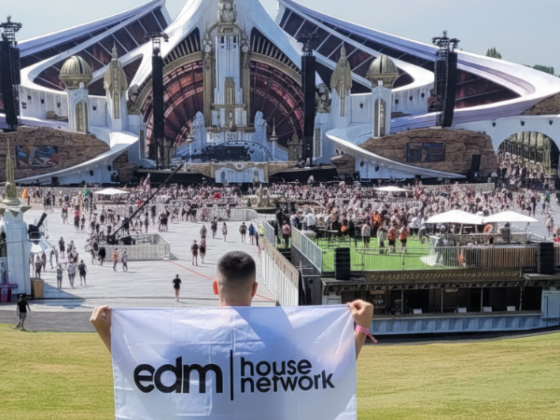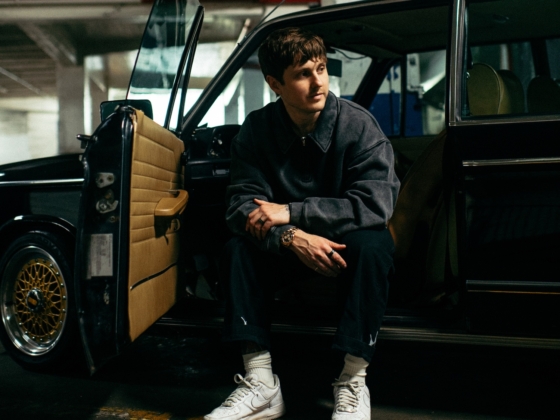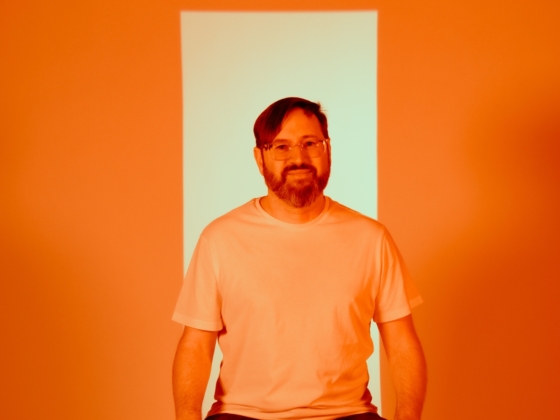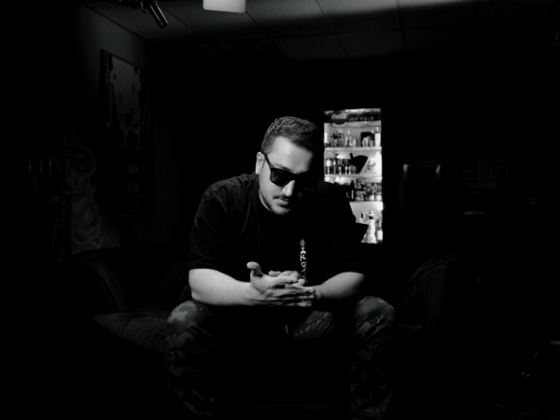No, his name is not Dave. Charlie Sahm, also known as Player Dave, is a San Diego-based electronic artist whose exact genre is a mystery to even himself – but it works. He's been making waves in the electronic music scene since 2016 and has learned quite a bit along the way. Between shifts in his musical direction, his social media content, and the shows he plays, the word that comes to mind describing Player Dave's career is aligned.
In a world of virality and short-term gratification, Player Dave commits to intentionality and staying true to himself. With early musical roots and a deep appreciation for timeless music, he seeks to create true art that resonates beyond trends.
Player Dave sat down with EARMILK ahead of his set at III Points Music Festival in Miami to share more about his musical influences, career shifts, and Daisy Chain – his record label and event space.
So, how does performing at III Points feel compared to other cities, and what are you most excited about?
I think the city of Miami has a more rich local dance music scene than most other cities. So I think the foundational upbringings of the festival here – it just inspires really forward-thinking, cool, tasteful dance music. It's an honor to be on such a tasteful lineup, honestly.
And I know you said you haven't performed here before. Have you attended the festival before?
Yeah, last year.
I read that you played the piano, cello, drums, and violin when you were growing up. How do those classical music roots influence where you're at currently?
I think it mostly just influences the stuff I listen to on a day-to-day basis that inspires my music. I listen to dance music, but I also listen to a bunch of other stuff. So, you know, I think influential-wise, in the writing process particularly, I usually start with instruments, so I think that alone kind of automatically points me in a certain direction with what I'm creating.
And then also where I'm deriving inspiration from. I think over time – especially when you're growing up – your ear kind of molds in a certain way to some taste. So, I think whatever you're exposed to really influences that. I'm really grateful for being around music a lot.
How would you personally describe your sound?
It's hard because I think some people – depending on what time they found me – probably think I make totally different music because I go through phases where I like a certain type of music and I really want to create stuff that's inspired by that. So that'll influence certain BPMs or rhythmic styles and I think over time it's evolved. So for me, certain sounds of mine are more immature. Meanwhile, I had somebody last night come up to me after my set at The Ground and be like, 'Is your III Points set going to be as house-music driven as this one?'
I like the clubbier stuff right now – and especially being in Miami, it evokes more of the clubby music out of me anyway. So, I think the best umbrella I could put it under always is just experimental electronic music because I feel like the second I say I do a certain genre, the next day I'm over it and making another one.
I think I draw a lot of influence from certain genres, so I don't really know what to call it, I think some of my songs fit into certain genres. Garage is probably the best one, but then the next song on the album will be a hip-hop beat, you know what I mean?
Yeah, I truly feel like you're all over the place!
Yeah, and I think it drives a lot of fear because I don't know where I fit in, but I cannot help but do it. The only thing I can do is just be all over the place, so I got to just kind of lean into it.
What would you say the most significant turning point in your career was that shaped where you're at right now?
It was really evaluating what I was surrounded by. I was getting booked on a lot heavier lineups back in the day, and I realized that when I would walk into the studio the last thing I ever wanted to do was make heavy music and it just made me get super real. And I knew that it was probably going to stop a lot of me getting shows. Direction change is a lot more than it seems at the surface.
You take a direction change, let's say in January and in March, two years later, promoters are catching up to it. So, that's resulted in me declining most of the opportunities that are coming my way. It's like if you're playing basketball and then one day you decide to play football and then you have recruiters for basketball hitting you up and you're like, 'No, I don't do that anymore.'
I wish it didn't have to be such a hard cut, but unfortunately, being involved in a certain space, there are so many things that point towards that. Collaborators, promoters you're working with, cities you're playing in – there's certain music that doesn't even reach certain cities because there's no market for it.
The biggest thing that pointed me in the direction of where I am right now is the timeless state of dance music. I listen to records that I think are just as inspiring now and they're 20 years old versus music I used to be into – there wasn't even music that sounded like that 20 years ago. I feel where I'm at right now is a more mature space for my sound and it feels the most aligned than I've ever felt. Now, I walk into the studio and I'm excited to make that music. But the biggest thing for me was just looking at what I'm surrounded by and being honest with myself, 'Is this who I want to be aligned with?' If I were to die tomorrow, is this what I want my catalog standing next to?' That was the biggest driving force. And it's not really a social thing or an ego acceptance thing, it really just comes back to art and just like how much I give a shit about really tasteful music. I just want to be – in my opinion – on the right side of the history of dance music.
Now, who would you say – bands, current DJs, singers – influences you the most?
Right now I'd say Overmono and Joy Orbison – they've been big influences for a long time. And now, they're starting to get a lot of shine, which is so fucking cool to me. I've liked that music since I found dance music and seeing them stick with it – you know, they've been doing this since I was born. They're still sticking to their guns, and now they're getting their flowers. Their music has already stood the test of time and their career is just beginning which is insane because a lot of people now blow up on TikTok but their music has us to the test of time. Then, they have all this pressure to continue this extremely high level of performance and it's basically impossible to do.
Some people are better at it than others with sustaining that, but I think with artists like a Joy Orbison – somebody who's been a tastemaker for two decades plus in multiple styles of music on multiple continents. Seeing that stuff get popular now is so fucking cool to me and to see that he hasn't changed anything. He's not making reels and TikToks trying to go viral. He's literally just making good music. That to me is inspiring because I can't really keep up with the whole short-form content thing, but I love making music and I love banging my head against the wall trying to make better music. To see that work out for somebody is awesome.
These days, it's a lot of people in your ear telling, you, 'No, it's fine. It doesn't have to come to your art, but you have to do this. You have to make a TikTok, you have to do all these content ideas or else you're kind of fucked. No one's going to want to work with you and support you.' Some people are so good at doing that and it's not cringy and it's really cool, but for me, it's really hard to do that stuff. It just doesn't flow naturally. So, the most inspiring thing to me is seeing people stay authentic and get in their shine.
Do you have a lot of people on your team telling you to go down the social media route? Maybe different artists that you're connected with?
I think I'm stubborn to a fault. It's only natural for them to motivate me to want to do things that are going to give me more exposure – and that's their job. And it's our job as a team to find the middle ground. It's not make TikToks every day or nothing, right? Recently I've been leaning more into really cinematic videos because for me it's very art-driven. I love color grading. So, getting behind a camera and filming really cinematic stuff, creating art visually, and then pairing music with it – that is super authentic to me and I love doing that. It doesn't really perform that well on algorithms, but, I love doing it and I'm fine doing that type of content.
And then, that's where my managers will come in and be like, 'Okay, well, what if you took that and then did this and then, let's try to meet in the middle here.' Or, I love remixing stuff, so they're like, 'Hey, let's post more remixes,' or whatever it is.
You had a remix come out recently, "Daydream" – can you tell us a little more about that?
That's a remix of the first release on my new label that wasn't me. It was the first time I was releasing somebody else's art solely. So, I figured remixing it made the most sense to do my spin on the first record on the label that's not me.
We talked about your musical roots earlier – did you always know you wanted to be in music?
Yeah. I saw the School of Rock when I was four and I was like, 'I want to be Zach Mooneyham' – the guitar kid. I literally locked myself in my room for like ten years learning guitar.
Did you ever expect to like be in electronic music specifically?
No, it happened so strangely. So many things happened – it was such a spiritual process, honestly. I could not have planned this in any way. So many random things, so many people that I knew when I was really young that I bumped into ten years later that changed the trajectory of what I'm doing now and inspired me to move into this realm of stuff. I moved to California and again, just one introduction of a person and it's completely shifted everything. So no, I had no idea I was going to do this.
Even when I started making music and getting fully driven about doing music for a living, I still didn't even understand DJing or that I was going to do that. I didn't know that was going to come with the job of making electronic music. So my approach towards making music and releasing it was extremely naive to what I'm doing now.
Your Insomniac profile tells us you've been quietly creating a new body of work that further progresses your story as an artist. Can you tell us what exactly that means?
I don't know what that when that was written or what that's referencing, but, I am. I don't know how they know that, but I am. I think that's from an old bio, but I know what it's referencing and that's somewhat of what I'm making currently. It's really hard in this day and age to see everybody going viral, all this crazy shit. Everything's so fast. It's really hard to pump the brakes and try to make your best work.
I've been doing a lot of releases and saving a lot of releases over the last two years that I've been compiling into the next album for me – it's called 'Float'. Working title currently, maybe it'll change. But, it's just this body of work of me experiencing life and trying to find my way. This path of career – as much as it looks so fun and cool – it's very challenging mentally and emotionally. There are a lot of internal battles that most people can't relate to. Not in a way of like 'Oh, you don't get me,' but they're really unique feelings. Anytime I talk to people that aren't involved in being an artist that's releasing music is like, 'Oh, that's so cool – you get to do what you love. Just be grateful.' And I am grateful, but there's a lot of taxing emotional baggage that comes with it. A lot of this music is just me coping with that.
And like you said in the beginning, like my shit's all over the place. It's me trying to figure out how to compile all parts of me into a body of work which has always been really difficult. But, whenever it's finished it always ends up working out.
I saw you were with Ivy Lab on some of their tour dates last month. Can you tell us about your experience and what you took away from sharing the stage with them?
Gove from Ivy Lab has been a huge inspiration for a while. My girlfriend manages their project, but I've never done a show with them. We've been friends for years and I was always like, 'Does he just have a personal vendetta against me?' So to be invited on the tour was really humbling and exciting.
I just aligned so much with their art because they too just kind of make whatever they want all the time and I really align with that. I've never been invited on a tour that I've said yes to, so it was fun. It was literally just five in a row – Rochester, Columbus, Brooklyn, Chicago and Minneapolis.
Do you have a favorite city that you've performed in, or a favorite venue?
I love performing in San Diego because I have an event company in San Diego and a full community of people who love what I do and I live there, so I love playing there for the Daisy Chain community. I also love playing in Miami, honestly. It's just another local scene that I get on with. D.C., I love. My shows used to do well in D.C. and there are a couple of clubs there I like performing in.
But, I personally think it comes down to the promoter and the space they've cultivated more so than the location.
That's a good segue into Daisy Chain Recordings –tell us all about it.
I haven't really found a label that makes the most sense for me being all over the place. A lot of them are stylistic and it's kind of hard floating in the abyss solo and no one knows who to gel you with. Other similar artists go off the one song they heard of you, which kind of shoots me in the foot because they hear one song and think that's all I do. So I was like, maybe it's time to build an ecosystem that I can evolve inside of and make it bigger than just me.
It's rare that an artist is solo, able to punch through and cultivate an existing movement and world-building. For instance, if you take PG Lang – one of my biggest influences – they don't even call themselves a label. It's like this brand vision and it's a compilation of all these other artists. What they're doing is so much more powerful than if it was just, you know, Kendrick doing his own thing or Keem doing his own thing. It's like this whole fucking world that. Recently, all they've been doing is ads and even they're ads for CashApp – I'm inspired as hell by that. There's a lot of stuff that puts context into what an artist is doing. And a lot of that comes with the imprint it's put out on.
So, summing up all that and my opinions with that have influenced me to make the label. I've had this brand and this event series in San Diego for almost three years and there are a lot of up-and-coming artists that are always sending me music that want to get on shows. And a lot of people in other states are like, 'Hey, do you want to do a Daisy Chain in this state?' And I'm like, 'Well, what the hell would make a Daisy Chain?'
I don't even play all the Daisy Chains, I've played like three. So, even me headlining it doesn't make a Daisy Chain. And I was just kind of like, 'What can I do to make Daisy Chains' imprint on something anywhere? How do I do that?' And to me, it was building a roster of artists that make music that I'm inspired by. And it doesn't have to be a certain type of music. Right now it's really emotive, breakbeat, garage, electronic music. But, there's a lot of stuff on the horizon that I'm excited to put out and build that ecosystem.
I know you're on this journey and figuring things out, but from where you're at right now and all the things that you've learned – what piece of advice would you give to your younger self trying to get into this career?
Don't let opportunity deter you from what you feel is right. Literally just trust whatever you're making and whatever you think sounds good. That's your only shot at staying relevant for a long time because you can't fake that. And if you fake what you're making, it's just a ticking time bomb until you're going to need to switch directions – because you can only keep up the front for so long.
Connect with Player Dave: Official Website | Instagram | TikTok | X | Spotify | SoundCloud | Daisy Chain Website

